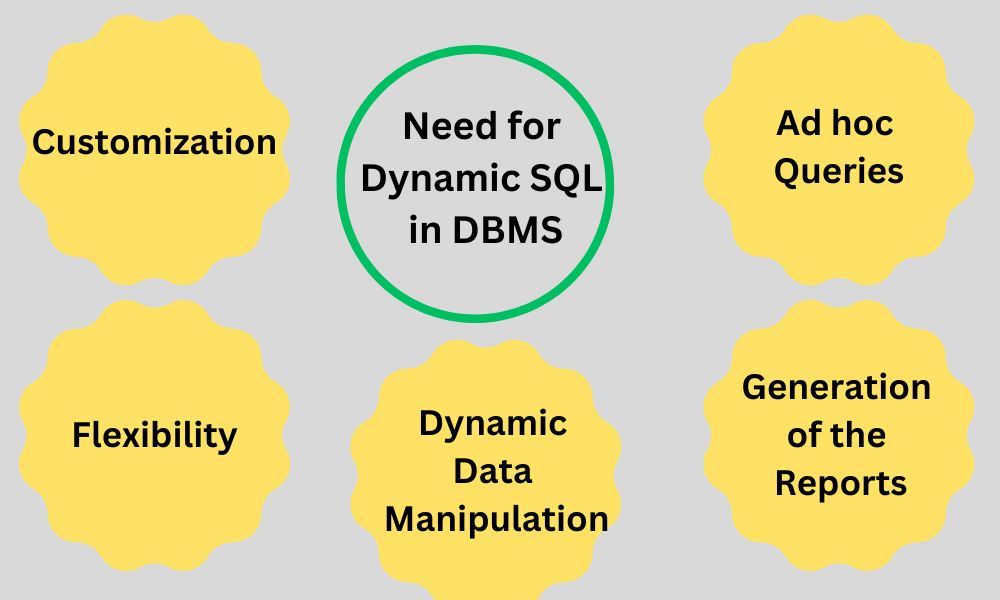Dynamic SQL in DBMS prepares or constructs the SQL statements dynamically at runtime. So, it involves complex query construction and execution. Static SQL is generally hardcoded. Let’s see Dynamic SQL in DBMS in detail.
Know about Basic SQL in DBMS.
What is Dynamic SQL in DBMS?
Dynamic SQL is the SQL statement that is being formed dynamically during runtime at the time of the execution of the SQL statement. It’s not being hardcoded in the code in the application.
So, it runs dynamically based on the user inputs and the changing conditions and thus allows more flexibility in the execution of the queries.
What are the steps involved in Dynamic SQL in DBMS?
Dynamic SQL in DBMS typically follows the following steps:
- Construction of Query: In the Programming language, the SQL statement is dynamically constructed as a string, and is used to interface with DBMS. So, it involves the addition of conditional logic, concatenation of the strings, or simply using the variables to generate the SQL statement.
- Preparation of Statement: DBMS is responsible for the preparation and compilation of Dynamic SQL in DBMS. This step is used to parse and validate the syntax of the SQL, also before executing the query, check the permission of the user who is executing the query.
- Binding of Parameter: If the parameter values are used to prepare the SQL statements, this is basically with the parameterized queries. It is used for performance and security reasons. This makes the query more efficient as it uses the same compiled statement again, and helps in preventing SQL injections.
- Execution: The execution of the parameterized and the prepared SQL is being done., and the result for the same is to call the application. It is the responsibility of the DBMS to handle the optimization of queries, data retrieval, and any modifications required further.
Dynamic SQL in DBMS is used where the content or the structure of the SQL query needs to adapt dynamically. The functionality which makes this implemented are:
- Complex reports generation with variable filtering conditions.
- Search functionality to be implemented with dynamic search criteria
- creation of a flexible database.
What is the need for dynamic SQL in DBMS?
There are lots of use cases which involved dynamic SQL in DBMS, and some of them are:
- Customization: Based on the application settings and user preferences, Dynamic SQL in DBMS allows the customization of queries. Basically, through this, the user will able to specify different sorting options and multiple search criteria, and thus it results in much tailored and personalized query results.
- Flexibility: Since Dynamic SQL in DBMS allows queries to adapt to the dynamically changing users’ inputs and various conditions, it becomes more flexible and the execution is much faster and easier. It allows the queries to be constructed during runtime conditions.
- Dynamic Data Manipulation: Dynamic SQL in DBMS also allows the data to be manipulated dynamically. Statements like INSERT, DELETE, and UPDATE can be executed dynamically based on certain application logic and user actions.
- Ad hoc Queries: If the content or structure of the queries is not known in advance, then Dynamic SQL in DBMS is very useful. It allows the users to prepare and construct the query on the fly, thus giving them more control and freedom over the retrieval of the data.
- Generation of the Reports: Dynamic SQL in DBMS is often used in report generation. As it allows the preparation of the reports dynamically with a variety of filters, grouping, sorting, and aggregation options.
What is the difference between static and Dynamic SQL in DBMS?
The key differences between Static and Dynamic SQL in DBMS are:
- Construction: Static SQL is the SQL statements written directly in the stored procedures or applications. These statements are hard coded and generally fixed at a compile time. whereas Dynamic SQL in DBMS constructs the SQL statements at runtime by using variables, concatenations, and expressions.
- Performance: The performance of the Static SQL is far better than the Dynamic SQL in DBMS, as static SQL are pre-compiled statements and are thus optimized. whereas Dynamic SQL is compiled at runtime, which adds more resources and thus reduces performance.
- Maintainability: In Static SQL, the SQL statements are written in the stored procedures or the code, therefore it is easy to maintain the Static SQL. In Dynamic SQL in DBMS, it becomes more difficult to maintain and debug in real time.
- Security: Static SQL is more secure as compared to Dynamic SQL in DBMS, as Static SQL the statements are hardcoded and thus are less prone to errors, whereas in Dynamic SQL, it accepts the inputs at runtime, and if the user inputs something without proper validation then it can also become SQL injection attack.
- Flexibility: Dynamic SQL in DBMS are more flexible as the statements are capable to adapt the various conditions and the user inputs during runtime and since the static SQL, the statements are hardcoded, so if there is any change it will require a code change.
Overall, Static SQL provides simplicity and performance benefits, where it lacks in case of flexibility. Dynamic SQL in DBMS are more flexible and adaptable but requires more attention in terms of risks and security.
Also, know about the Advanced SQL in DBMS.
What are the limitations of Dynamic SQL in DBMS?
Since Dynamic SQL in DBMS provides more adaptability and flexibility, it has certain limitations also. Let’s see them.
- Code Maintenance and Complexity: The code is more complex, and it is harder to maintain in Dynamic SQL in DBMS, as compared to static SQL. As the code logic is not visible in Dynamically generated statements, and thus it becomes harder to debug and troubleshoot.
- Security Risks: If not handled properly, Dynamic SQL in DBMS are very much prone to risks, as the SQL statements are generally constructed by concatenating the user inputs and variables in run time, and if it is not validated correctly, it can often lead to SQL injection attacks. Therefore, it is very important to validate this thing properly before constructing the statement.
- Reduced Readability: Dynamic SQL in DBMS reduced the readability as the code cannot be understood, especially when it involves more complex logic such as the concatenation of multiple strings.
- Limited Static Analysis: As Dynamic SQL in DBMS, is prepared at runtime, therefore, it limits the ability of various static analysis tools to perform optimization and compile time checks. A lack of Static Analysis may lead to an increase in the chances of many undetected issues.
This article talks in detail about Dynamic SQL in DBMS, and how it helps in forming more extensive data, and results in a very usable manner as the user expects. The reporting and analysis become very easy and thus help display more complex data in a more feasible manner.


